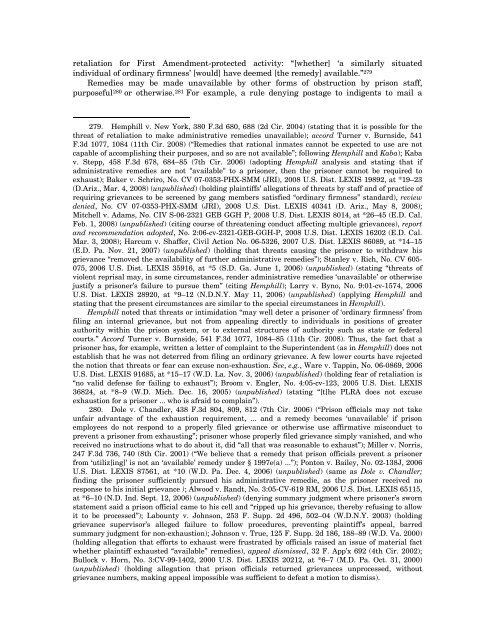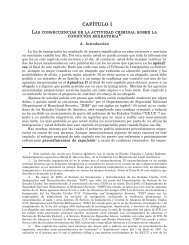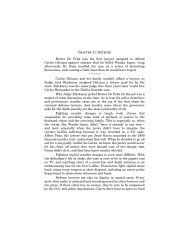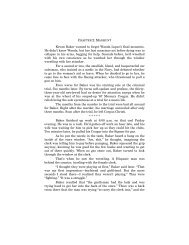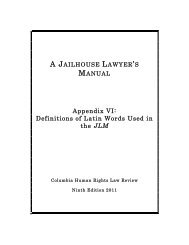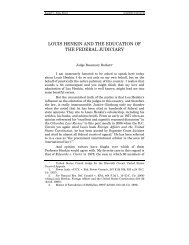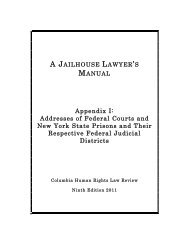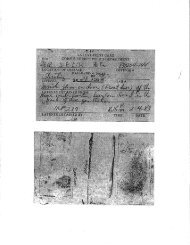A Jailhouse Lawyer's Manual Chapter 14 - Columbia Law School
A Jailhouse Lawyer's Manual Chapter 14 - Columbia Law School
A Jailhouse Lawyer's Manual Chapter 14 - Columbia Law School
Create successful ePaper yourself
Turn your PDF publications into a flip-book with our unique Google optimized e-Paper software.
etaliation for First Amendment-protected activity: “[whether] ‘a similarly situated<br />
individual of ordinary firmness’ [would] have deemed [the remedy] available.” 279<br />
Remedies may be made unavailable by other forms of obstruction by prison staff,<br />
purposeful 280 or otherwise. 281 For example, a rule denying postage to indigents to mail a<br />
279. Hemphill v. New York, 380 F.3d 680, 688 (2d Cir. 2004) (stating that it is possible for the<br />
threat of retaliation to make administrative remedies unavailable); accord Turner v. Burnside, 541<br />
F.3d 1077, 1084 (11th Cir. 2008) (“Remedies that rational inmates cannot be expected to use are not<br />
capable of accomplishing their purposes, and so are not available”; following Hemphill and Kaba); Kaba<br />
v. Stepp, 458 F.3d 678, 684–85 (7th Cir. 2006) (adopting Hemphill analysis and stating that if<br />
administrative remedies are not "available" to a prisoner, then the prisoner cannot be required to<br />
exhaust); Baker v. Schriro, No. CV 07-0353-PHX-SMM (JRI), 2008 U.S. Dist. LEXIS 19892, at *19–23<br />
(D.Ariz., Mar. 4, 2008) (unpublished) (holding plaintiffs’ allegations of threats by staff and of practice of<br />
requiring grievances to be screened by gang members satisfied “ordinary firmness” standard), review<br />
denied, No. CV 07-0353-PHX-SMM (JRI), 2008 U.S. Dist. LEXIS 40341 (D. Ariz., May 8, 2008);<br />
Mitchell v. Adams, No. CIV S-06-2321 GEB GGH P, 2008 U.S. Dist. LEXIS 80<strong>14</strong>, at *26–45 (E.D. Cal.<br />
Feb. 1, 2008) (unpublished) (citing course of threatening conduct affecting multiple grievances), report<br />
and recommendation adopted, No. 2:06-cv-2321-GEB-GGH-P, 2008 U.S. Dist. LEXIS 16202 (E.D. Cal.<br />
Mar. 3, 2008); Harcum v. Shaffer, Civil Action No. 06-5326, 2007 U.S. Dist. LEXIS 86089, at *<strong>14</strong>–15<br />
(E.D. Pa. Nov. 21, 2007) (unpublished) (holding that threats causing the prisoner to withdraw his<br />
grievance “removed the availability of further administrative remedies”); Stanley v. Rich, No. CV 605-<br />
075, 2006 U.S. Dist. LEXIS 35916, at *5 (S.D. Ga. June 1, 2006) (unpublished) (stating “threats of<br />
violent reprisal may, in some circumstances, render administrative remedies ‘unavailable’ or otherwise<br />
justify a prisoner’s failure to pursue them” (citing Hemphill); Larry v. Byno, No. 9:01-cv-1574, 2006<br />
U.S. Dist. LEXIS 28920, at *9–12 (N.D.N.Y. May 11, 2006) (unpublished) (applying Hemphill and<br />
stating that the present circumstances are similar to the special circumstances in Hemphill).<br />
Hemphill noted that threats or intimidation “may well deter a prisoner of ‘ordinary firmness’ from<br />
filing an internal grievance, but not from appealing directly to individuals in positions of greater<br />
authority within the prison system, or to external structures of authority such as state or federal<br />
courts.” Accord Turner v. Burnside, 541 F.3d 1077, 1084–85 (11th Cir. 2008). Thus, the fact that a<br />
prisoner has, for example, written a letter of complaint to the Superintendent (as in Hemphill) does not<br />
establish that he was not deterred from filing an ordinary grievance. A few lower courts have rejected<br />
the notion that threats or fear can excuse non-exhaustion. See, e.g., Ware v. Tappin, No. 06-0869, 2006<br />
U.S. Dist. LEXIS 91685, at *15–17 (W.D. La. Nov. 3, 2006) (unpublished) (holding fear of retaliation is<br />
“no valid defense for failing to exhaust”); Broom v. Engler, No. 4:05-cv-123, 2005 U.S. Dist. LEXIS<br />
36824, at *8–9 (W.D. Mich. Dec. 16, 2005) (unpublished) (stating “[t]he PLRA does not excuse<br />
exhaustion for a prisoner ... who is afraid to complain”).<br />
280. Dole v. Chandler, 438 F.3d 804, 809, 812 (7th Cir. 2006) (“Prison officials may not take<br />
unfair advantage of the exhaustion requirement, ... and a remedy becomes ‘unavailable’ if prison<br />
employees do not respond to a properly filed grievance or otherwise use affirmative misconduct to<br />
prevent a prisoner from exhausting”; prisoner whose properly filed grievance simply vanished, and who<br />
received no instructions what to do about it, did “all that was reasonable to exhaust”); Miller v. Norris,<br />
247 F.3d 736, 740 (8th Cir. 2001) (“We believe that a remedy that prison officials prevent a prisoner<br />
from ‘utiliz[ing]’ is not an ‘available’ remedy under § 1997e(a) ...”); Ponton v. Bailey, No. 02-138J, 2006<br />
U.S. Dist. LEXIS 87561, at *10 (W.D. Pa. Dec. 4, 2006) (unpublished) (same as Dole v. Chandler;<br />
finding the prisoner sufficiently pursued his administrative remedie, as the prisoner received no<br />
response to his initial grievance ); Alwood v. Randt, No. 3:05-CV-619 RM, 2006 U.S. Dist. LEXIS 65115,<br />
at *6–10 (N.D. Ind. Sept. 12, 2006) (unpublished) (denying summary judgment where prisoner’s sworn<br />
statement said a prison official came to his cell and “ripped up his grievance, thereby refusing to allow<br />
it to be processed”); Labounty v. Johnson, 253 F. Supp. 2d 496, 502–04 (W.D.N.Y. 2003) (holding<br />
grievance supervisor’s alleged failure to follow procedures, preventing plaintiff’s appeal, barred<br />
summary judgment for non-exhaustion); Johnson v. True, 125 F. Supp. 2d 186, 188–89 (W.D. Va. 2000)<br />
(holding allegation that efforts to exhaust were frustrated by officials raised an issue of material fact<br />
whether plaintiff exhausted “available” remedies), appeal dismissed, 32 F. App’x 692 (4th Cir. 2002);<br />
Bullock v. Horn, No. 3:CV-99-<strong>14</strong>02, 2000 U.S. Dist. LEXIS 20212, at *6–7 (M.D. Pa. Oct. 31, 2000)<br />
(unpublished) (holding allegation that prison officials returned grievances unprocessed, without<br />
grievance numbers, making appeal impossible was sufficient to defeat a motion to dismiss).


